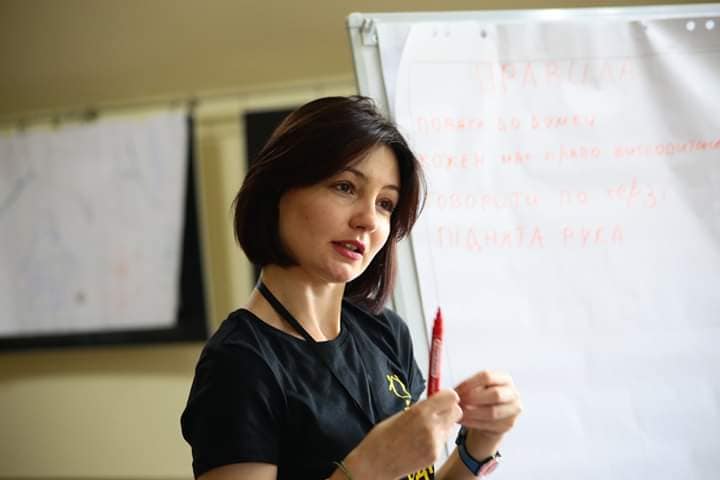
Educators who registered for the webinar had an opportunity to watch the documentary Caught in the Net by directors Barbora Chalupová and Vít Klusák in advance. This allowed them to deeper engage in a focused discussion during the session on the various forms of online sexual abuse against children and obtain practical recommendations on the ways to support children, which included examples of working with the film.
The film made a lasting impression on the audience. Alina, a webinar participant, noted, “I was shocked by this film. It looked like something that just couldn’t be real! This is precisely why such documentaries reveal the true nature of online abuse.” Another participant, Oleksandr, added, “This is a powerful piece. As a school psychologist, I find it helpful as a tool of facilitating meaningful conversations with students on this complex topic.”

A still from the film Caught in the Net.
The webinar was hosted by Mariana Hevko, psychologist, expert for the awareness campaign Sexual Violence on the Internet: How to Protect Children, and project manager of the DOCU/CLUB Network. She structured the training with the goal to not only familiarize educators with theories on the types of sexual abuse and legal mechanisms for protecting children, but also to provide practical recommendations on supporting victims and conducting educational activities for students and parents.
This practical component of the webinar sparked numerous questions from attendees. During the discussion, educators noted that parents often fear or do not know how to talk to their children about online abuse, while educational institutions lack trained professionals with sufficient knowledge of both the legislation and child psychology. Therefore, this opportunity to enhance their qualifications and gain the necessary tools to discuss this topic with children was of great importance to them.
Educators actively shared their concerns and questions, many of which reflected uncertainty and anxiety: Could a child make up a situation? How can one tell whether a child is in trouble? How should teachers respond in such situations?

Mariana Hevko
Mariana Hevko provided a detailed explanation of the indicators of abuse that may manifest in a child’s behavior and should draw the teachers’ attention. She also offered recommendations for working with parents, emphasizing that the goal of the awareness campaign is to underscore the essential role of adults in protecting children from online abuse. Educators, she stressed, are in a position to inform parents about this dangerous phenomenon and the risks their children may face. Parents, in turn, must be taught the principles of online safety and equipped with tools to protect their children.
“We must believe children and adhere to the principle that a child always tells the truth when disclosing sexual abuse,” Hevko emphasized during the webinar. “Expert assessments and investigations can determine whether a child has in fact experienced trauma, but such evaluations should be carried out by competent institutions and professionals. At the same time, we ourselves must be honest with children and maintain a trusting relationship, openly and sincerely informing them about the protective measures we will take to keep them safe from perpetrators.”
Two hours of training enriched participants with new knowledge and practical tools. Anna, one of the webinar participants, shared, “The film and this webinar will help me hold a discussion with students about online abuse. I’m planning an event in the near future. Today, I clarified for myself how to structure a conversation, what terminology is appropriate to use when speaking with schoolchildren, and how to respond to their questions. This knowledge is incredibly valuable.”
We hope that the collaboration between the DOCU/CLUB Network and the educational community of EdCamp Ukraine will continue. After all, only informed and safety-oriented adults can effectively protect children from sexual abuse on the Internet.
The development of the DOCU/CLUB Network is funded by the Embassy of Sweden in Ukraine and the National Endowment for Democracy (NED).
The opinions, conclusions or recommendations do not necessarily reflect the views of respective governments or charitable organizations of these countries. The author(s) of this publication are solely responsible for its content.



